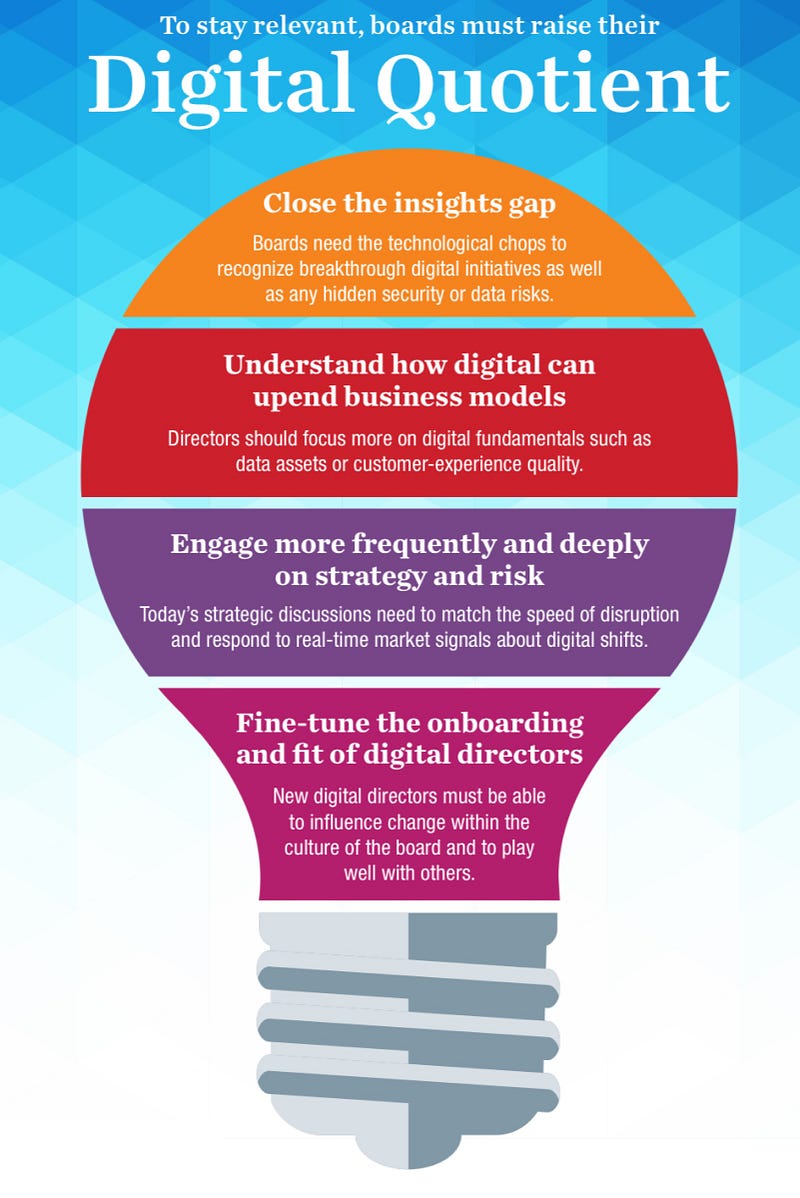Ho letto un interessantissimo articolo di McKinsey Quarterly intitolato “Adapting your board to the digital age” (luglio 2016). Ne riporto qui uno spezzone:
In a 2015 McKinsey survey, though, only 17 percent of directors said their boards were sponsoring digital initiatives, and in earlier McKinsey research, just 16 percent said they fully understood how the industry dynamics of their companies were changing. In our experience, common responses from boards to the shifting environment include hiring a digital director or chief digital officer, making pilgrimages to Silicon Valley, and launching subcommittees on digital.
Valuable as such moves can be, they often are insufficient to bridge the literacy gap facing boards — which has real consequences. There’s a new class of problems, where seasoned directors’ experiences managing and monetizing traditional assets just doesn’t translate. It is a daunting task to keep up with the growth of new competitors (who are as likely to come from adjacent sectors as they are from one’s own industry), rapid-fire funding cycles in Silicon Valley and other technology hotbeds, the fluidity of technology, the digital experiences customers demand, and the rise of nontraditional risks. Many boards are left feeling outmatched and overwhelmed.
To serve as effective thought partners, boards must move beyond an arms length relationship with digital issues. Board members need better knowledge about the technology environment, its potential impact on different parts of the company and its value chain, and thus about how digital can undermine existing strategies and stimulate the need for new ones. They also need faster, more effective ways to engage the organization and operate as a governing body and, critically, new means of attracting digital talent. Indeed, some CEOs and board members we know argue that the far-reaching nature of today’s digital disruptions — which can necessitate long-term business-model changes with large, short-term costs — means boards must view themselves as the ultimate catalysts for digital transformation efforts. Otherwise, CEOs may be tempted to pass on to their successors the tackling of digital challenges.
At the very least, top-management teams need their boards to serve as strong digital sparring partners when they consider difficult questions such as investments in experimental initiatives that could reshape markets, or even whether the company is in the right business for the digital age.
Per rispondere a queste sfide, l’autore ritiene essenziale elevare il “digital quotient” attraverso una serie di azioni sintetizzate da questa figura:

Secondo voi, i nostri consigli di amministrazione e i responsabili delle amministrazioni pubbliche rispondono a questi requisiti? Stanno forse facendo quanto suggerisce l’autore?
Mi state dicendo che avete qualche dubbio in proposito? Pensate che molti “manager” facciano “pilgrimages to Silicon Valley” e che più che pellegrinaggi siano gite aziendali? Avete il timore che per troppi le “tecnologie siano solo commodity e una moda che passa”? Ritenete che le competenze digitali siano sempre messe in seconda fila perché “i problemi non sono mai tecnologici”? O forse temete che molte aziende siano ancora legate a idee tipo “dovremmo tornare alla lira o proteggere con leggi i nostri prodotti così da non soffrire per la concorrenza e la globalizzazione”?
Pensate che questo paese sia indietro sul digitale, che pochi se ne preoccupino e che molti al contrario lo osteggino o snobbino?
Beh, anche io.










Facebook Comments